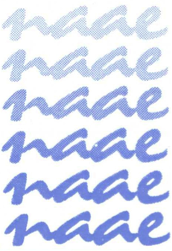It all started when…
The NAAE was founded in 1989 with the support of the Joint Council of Cultural and Education Ministers. It was formed as an advocacy and research body in response to the National Arts in Australian Schools project, set up by the Federal Government in collaboration with the States and Territories. Its peak member organisations include art form experts who are teachers, curriculum writers, advocates and arts education academics.
Representing around 10,000 professionals at all levels of schooling and in tertiary institutions, it has since advocated for arts education in schools, provided expert advice, and developed arts education policy that promotes quality teaching and learning in the arts. NAAE has worked for 30 years with politicians, government agencies, teachers, schools and tertiary institutions to achieve its aims.
Key achievements include:
Ensuring that the arts are recognised as key learning areas in the Australian curriculum through partnerships with government agencies including the Curriculum Corporation, The Ministerial Council on Education, Employment, Training and Youth Affairs (MCEETYA), federal government departments and the Australia Council for the Arts.
Bringing arts education to national prominence by convening the 1993 Arts and Education Summit, and the 1995 National Arts Education Conference in Canberra, co-hosted with the Australia Council.
Establishing the Centre for Arts Education at the University of Canberra in 1994, having received three-year federal funding for arts curriculum research & communication.
Making a much-quoted submission to the 1995 Senate Enquiry into Arts Education, and appearing before the inquiry in Canberra.
Publishing support material for teachers, including More than words can say – a view of literacy through the arts, The Mayer Key Competencies and Arts Education and Sampling the Arts.
Successfully lobbying then federal education minister Peter McGauran for Australian research into arts education (later undertaken by the Australia Council) in response to the US Champions of Change research.
Making submissions to the DEST Review of Teaching and Teacher Education [2003] and the NIQTSL Issues paper [2004].
Providing detailed feedback to the Australia Council for its proposed ten-year strategy for education and the arts, leading to the Backing our Creativity summit (2005) and the National statement on education and the arts (2007).
Successfully lobbying the federal government and ACARA to have five art forms included in the national curriculum and the Early Years Learning Framework in 2008.
Providing expert advice and networks to ACARA in the development of The Australian Curriculum: The Arts.
